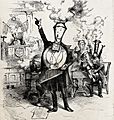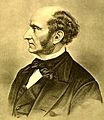Competition law facts for kids
Competition law is like a set of rules that stops companies from playing unfairly. Imagine a game where everyone should have a chance to win. These laws make sure that big companies don't cheat or stop smaller companies from competing.
In different parts of the world, these laws have different names. In the United States, it's often called antitrust law. In China and Russia, they call it anti-monopoly law. It used to be known as trade practices law in the United Kingdom and Australia. In the European Union, you might hear it called both antitrust and competition law. No matter the name, the goal is the same: to keep markets fair and open for everyone.
Contents
What is Competition Law?
Competition law helps make sure that businesses compete fairly. It stops them from doing things that could harm customers or other businesses. For example, it prevents companies from agreeing to fix prices or from becoming so big that they control an entire market.
Why Do We Need These Laws?
These laws are important for several reasons:
- Fair Prices: When companies compete, they try to offer better prices to attract customers. Without competition, a single company could charge very high prices.
- Better Products: Competition encourages companies to innovate and create better products or services. If they don't, customers will go to a competitor.
- More Choices: When many companies compete, customers have more options to choose from.
- Economic Growth: A healthy competitive market helps the economy grow by encouraging new businesses and ideas.
How Do Companies Break These Rules?
Companies can break competition laws in several ways:
- Cartels: This is when competing companies secretly agree not to compete. For example, they might agree to all charge the same high price for a product. This is like cheating in a game.
- Abuse of Dominance: If a company becomes very large and powerful, it might try to stop smaller companies from entering the market. This could involve making it impossible for new businesses to compete.
- Mergers: Sometimes, two big companies want to join together. Competition law checks if this merger would create a company that is too powerful and would harm competition.
Cartels: Secret Agreements
A cartel is a secret agreement between companies that should be competing. They might agree to:
- Fix prices, so customers pay more.
- Limit how much they produce, making things scarcer and more expensive.
- Divide up customers or areas, so each company has its own "turf" without competition.
These actions hurt customers because they reduce choices and increase costs.
Abuse of Market Power
When a company has a very strong position in the market, it's called "dominant." It's not illegal to be dominant, but it is illegal to abuse that power. An example of abuse might be a dominant company selling products below cost just to drive out smaller competitors.
Mergers and Acquisitions
When companies combine, it's called a merger or acquisition. Competition authorities review these deals. They want to make sure that the new, bigger company won't have too much control over the market. If it would, they might block the merger or require the companies to sell off parts of their business.
History of Competition Law
The idea of stopping monopolies and unfair trade practices isn't new. People have been thinking about it for centuries.
- In the 17th century, a judge named Edward Coke in England believed that agreements stopping trade were unfair.
- Later, thinkers like Adam Smith, a famous Scottish philosopher, also spoke out against cartels. He thought they were bad for society.
- In the late 1800s, countries like the United States started creating specific laws, like the Sherman Antitrust Act, to deal with very powerful companies that were controlling entire industries.
Who Enforces These Laws?
Governments have special agencies or departments that enforce competition laws. For example, in the United States, the Federal Trade Commission (FTC) and the Department of Justice (DOJ) handle antitrust cases. In the European Union, the European Commission does this work. These agencies investigate companies and can impose fines or other penalties if rules are broken.
Images for kids
-
Judge Coke in the 17th century thought that general restraints on trade were unreasonable.
-
Senatorial Round House by Thomas Nast, 1886
-
John Stuart Mill believed the restraint of trade doctrine was justified to preserve liberty and competition.
-
Paul Samuelson, a famous economist, supported government policies to ensure fair markets.
-
Scottish Enlightenment philosopher Adam Smith was an early enemy of cartels.
See also
 In Spanish: Derecho de la competencia para niños
In Spanish: Derecho de la competencia para niños
 | Calvin Brent |
 | Walter T. Bailey |
 | Martha Cassell Thompson |
 | Alberta Jeannette Cassell |







